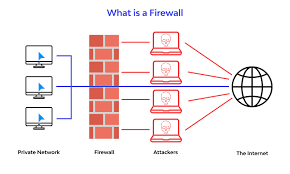
What is firewall?
A firewall is a security system that monitors and controls incoming and outgoing network traffic based on predetermined security rules. It acts as a barrier between a trusted internal network and untrusted external networks, such as the internet. Firewalls can be hardware-based, software-based, or a combination of both.
How it Works:
It acts as a barrier between your internal network and external networks, such as the internet. They monitor and control incoming and outgoing network traffic based on predefined security rules. Here are the main methods it use to protect your network:
Packet Filtering: Inspects individual packets of data and allows or blocks them based on source and destination IP addresses, ports, and protocols.
Proxy Service: Acts as an intermediary between users and the internet, filtering requests and responses to ensure security.
Stateful Inspection: Tracks the state of active connections and makes decisions based on the context of the traffic.
Network Address Translation (NAT): Hides internal IP addresses from external networks, adding a layer of security.
Here are some key functions:
Packet Filtering: Inspects packets of data and allows or blocks them based on predefined rules.
Proxy Service: Acts as an intermediary between users and the internet, providing additional security.
Stateful Inspection: Tracks the state of active connections and makes decisions based on the context of the traffic.
Network Address Translation (NAT): Hides internal IP addresses from external networks, adding a layer of security
How to Set Up:
Setting up a firewall involves several steps to ensure it effectively protects your network. Here’s a general guide:
- Prepare for Installation: Determine your security requirements, network architecture, and choose the appropriate firewall type (hardware or software).
- Set Secure Rules & Access Control Lists (ACLs): Define rules to allow or Block traffic based on IP addresses, ports, and protocols.
- Establish Network Zones: Segment your network into different zones (e.g., internal, external, DMZ) and apply specific security policies to each zone.
- Configure Firewall Policies: Set up policies to control traffic between different network zones.
- Enable Logging & Alerts: Configure logging to monitor traffic and set up alerts for suspicious activities.
- Test & Audit: Test the firewall configuration to ensure it works as expected and conduct regular audits to maintain security.
- Deploy the Firewall: Implement it in your network and monitor its performance.
- Manage & Maintain: Regularly update rules and firmware to protect against new threats.
Role of IT AMC services in Firewall installation
IT Annual Maintenance Contract (AMC) services play a crucial role in firewall installation and overall IT infrastructure management. Here are some key reasons why IT AMC services are important in this context:
- Proactive Maintenance and Support: IT AMC services provide proactive monitoring and maintenance of firewalls, ensuring they are always up-to-date and functioning optimally. This helps in identifying and addressing potential issues before they become major problems.
- Expertise and Specialization: AMC service providers have a team of skilled IT professionals who specialize in various areas, including firewall installation and management. Their expertise ensures that firewalls are configured correctly and securely.
- Cost Savings: By outsourcing IT maintenance to an AMC service provider, businesses can save on the costs associated with hiring and training in-house IT staff. AMC services also eliminate the need for purchasing expensive tools and software licenses.
- Enhanced Security: Regular updates and maintenance provided by AMC services help in protecting the IT infrastructure from security threats such as viruses, malware, and unauthorized access. This is particularly important for firewalls, which are the first line of defense against cyber threats.
- Data Backup and Recovery: AMC services often include data backup and recovery plans, ensuring that critical business data is protected and can be restored in case of any data loss incidents.
- Compliance and Best Practices: AMC providers ensure that the IT infrastructure, including firewalls, complies with industry standards and best practices. This helps in maintaining a secure and efficient IT environment.
Overall, IT AMC services are essential for maintaining the performance, reliability, and security of firewalls and other IT systems. They provide businesses with peace of mind, knowing that their IT infrastructure is in capable hands.


